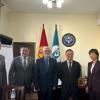News
Displaying Results 1 - 19 of 19
Central Asia is well placed to produce fresh and dried fruit and vegetables. Countries like Kyrgyzstan, Tajikistan, and Uzbekistan are important producers of dried fruit, in particular apricots. However, traders from the region have been facing challenges with diversifying their export portfolios…
As countries seek to rapidly decarbonize their economies, investing in energy efficiency and the improved performance of buildings offers significant near term gains. Available measures can help transform the building and construction sector, which today is responsible for approximately 40% of…
Sustainable and climate finance needs in Central Asia are considerable, with an estimated 38 billion US dollars per year up to 2030. On the other hand, the total foreign direct investment flows in the region in 2022 amounted to 10 billion US dollars. The infrastructure finance gap is therefore huge…
Sound emission inventories are the first step for designing effective clean air policies as they provide information about the main sources and the most acute air pollution problems in a country.
Under the Convention on Long-range Transboundary Air Pollution (Air Convention), UNECE has therefore…
Since 2009 when Public-Private Partnerships (PPPs) were introduced in Kyrgyzstan, 66 projects have been implemented in the country, providing access to critical public services to more than 1 million citizens. These PPP projects are the driving forces of the economic and social development in…
UNECE and partners have started implementation of a multi-year project on “Improving the energy efficiency of the global building supply chain industry and its products to deliver high performance buildings” (full project budget EUR 19.8 million), funded by the International Climate Initiative (IKI…
Mining is an important sector and economic contributor in Central Asian countries due to their rich mineral base. However, the mining activities also generate huge amount of waste which can contain hazardous substances and must be safely stored in so-called tailings management facilities (TMFs).…
Despite a marked overall improvement over the last ten years of the economic picture in Bishkek, Kyrgyzstan, urban planning lagged, and the development of basic and social infrastructure did not keep up with population increase, particularly in informal settlements. According to estimates shared…
Kyrgyzstan has been one of the pioneers of Public-Private Partnerships (PPP) in Central Asia, with the introduction of a PPP model in its legal and regulatory framework since 2009, and the most recent PPP legislation enacted in 2021. On the back of this PPP experience, the Government has launched…
Four years ago, the countries in the Caucasus and Central Asian region pledged to restore more than 3 million hectares of degraded forests by 2030 under the global Bonn Challenge. To support them in turning their pledges into reality, the United Nations Economic Commission for Europe (UNECE) and…
A large, multidisciplinary team of international experts under the leadership of UNECE is working in Bishkek, assessing the environmental performance of the country by examining developments during the past decade.
The third review of Kyrgyzstan measures progress made and considers challenges…
Improving energy efficiency is one of the most cost-effective options for climate action and to meet growing energy demand in most countries. It contributes to energy security, a better environment, improved quality of life, and economic well-being. Out of all sectors of economic activity, the…
Trade facilitation is a key priority for Kyrgyzstan and its trading community for participation in the global and regional trading system. Under the project on “Strengthening the capacity of the Kyrgyzstan National Trade Facilitation Council to implement the WTO Trade Facilitation Agreement”, UNECE…
Building regional capacity for devising and putting into practice trade facilitation policies is critical to strengthen trade as a driver of sustainable and resilient recovery.
UNECE teamed up with the Kyrgyz Economic University (KEU) to produce a professional development course on trade…
Developing the capacity of statistical systems to respond to ever-changing demands is a core component of UNECE statistical work, linked directly to several of the targets of the 2030 Agenda for Sustainable Development. Key tools used for capacity development have traditionally been face-to-face…
Countries of Central Asia, the Caucasus and Eastern Europe have been hit hard by the socioeconomic impacts of the COVID-19 pandemic, which threatens to derail sustainable development progress in the region.
However, there is also a stronger momentum towards regional cooperation, and countries can…
Improving energy efficiency is a cost-effective means to support economic development while contributing to climate action. On a national scale, energy efficiency helps strengthen energy security, reduce energy expenditure, slow down energy demand growth, reduce investment needs for new generation…
Innovation has huge potential to drive sustainable development if supported by a vibrant innovation ecosystem. This requires effective linkages and collaboration at national level, and an innovation culture nurtured by a system of support to start ups and institutions such as business incubators.…
Policy solutions for pressing problems like air pollution require sound data. Emission inventories can help in determining the major sources of air pollution in a given country.
As a result of integrated air pollution management strategies developed under the UNECE Convention on Long-range…




















